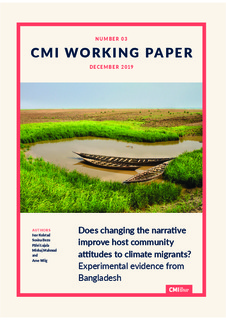| dc.contributor.author | Kolstad, Ivar | |
| dc.contributor.author | Bezu, Sosina | |
| dc.contributor.author | Lujala, Päivi | |
| dc.contributor.author | Mahmud, Minhaj | |
| dc.contributor.author | Wiig, Arne | |
| dc.date.accessioned | 2019-12-19T15:00:13Z | |
| dc.date.issued | 2019-01-01 | |
| dc.identifier | oai:www.cmi.no:7065 | |
| dc.identifier.citation | Bergen: Chr. Michelsen Institute (CMI Working Paper WP 2019:3) 25 p. | |
| dc.identifier.isbn | 978-82-8062-741-4 | |
| dc.identifier.isbn | 978-82-8062-741-4 | |
| dc.identifier.isbn | 978-82-8062-741-4 | |
| dc.identifier.isbn | 978-82-8062-741-4 | |
| dc.identifier.issn | 0804-3639 | |
| dc.identifier.issn | 0804-3639 | |
| dc.identifier.issn | 0804-3639 | |
| dc.identifier.issn | 0804-3639 | |
| dc.identifier.uri | http://hdl.handle.net/11250/2634201 | |
| dc.description.abstract | A number of studies suggest that our narratives about the situation of the poor and vulnerable affect how we view them and treat them. Theoretically, a potentially powerful way to make host communities more welcoming of climate migrants is to shift the blame for their situation away from the migrants themselves and onto other forces or agents. We present results from a randomized field experiment conducted among long term residents of host communities in the Satkhira district of Bangladesh.
We exposed three treatment groups to narratives that shift the responsibility for climate migration towards natural forces, Westerns countries, and local authorities, respectively. Despite power to detect reasonably small effects, we find no positive effects of the narratives on attitudes to climate migrants. On the contrary, one treatment has a borderline negative effect on attitudes relative to the control group. Our results suggest caution in attempting to influence attitudes through attribution of blame to outside forces or third parties. Such narrative interventions may shift responsibility away from not just the migrants but also from the treated host community residents, and may increase social identification within the host community relative to outsiders. | |
| dc.language.iso | eng | |
| dc.publisher | Chr. Michelsen Institute | |
| dc.relation | CMI Working Paper | |
| dc.relation | WP 2019:3 | |
| dc.relation.ispartof | CMI Working Paper | |
| dc.relation.ispartofseries | CMI Working Paper WP 2019:3 | |
| dc.relation.ispartofseries | CMI Working Paper WP 2019:3 | |
| dc.relation.ispartofseries | CMI Working Paper WP 2019:3 | |
| dc.relation.ispartofseries | CMI Working Paper WP 2019:3 | |
| dc.relation.uri | https://www.cmi.no/publications/7065-does-changing-the-narrative-improve-host-community-attitudes-to-climate-migrants | |
| dc.subject | Bangladeh | |
| dc.title | Does changing the narrative improve host community attitudes to climate migrants? Experimental evidence from Bangladesh | |
| dc.type | Working paper | |
| dc.identifier.cristin | 1798371 | |
| dc.identifier.cristin | 1798371 | |
| dc.identifier.cristin | 1798371 | |
| dc.identifier.cristin | 1798371 | |
